My Men are My Heroes (11 page)
Read My Men are My Heroes Online
Authors: Nathaniel R. Helms

Marines with Provisional Mortuary Affairs Company, including attached Company B, 2nd Transportation Support Battalion leathernecks, worked as quickly as possible to remove enemy dead from Fallujah.
U.S. Marine Corps photo by LCpl T. J. Kaemmerer
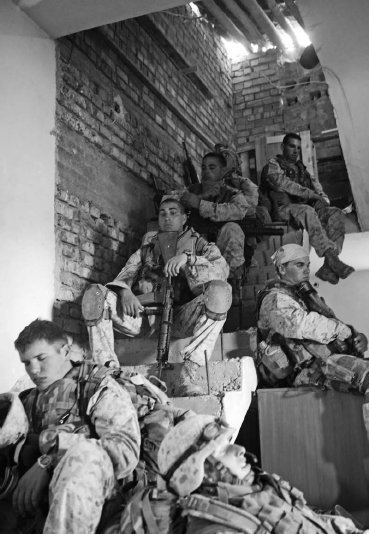
Leathernecks of Company I, 3rd Battalion, 5th Marines, fighting house to house and alleyway to alleyway, showed the exhaustion of all those in the Battle of Fallujah.
U.S. Marine Corps photo by Sgt Luis R. Agostini
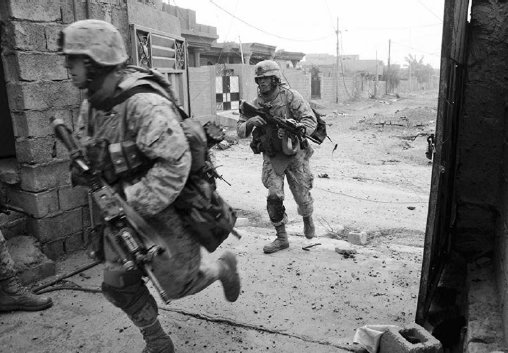
In November 2004 leathernecks of RCT-1 and the Army's 2/7 Cavalry were tasked with securing the western half of Fallujah. RCT-7 and the Army's 2/2 Infantry were tasked with clearing the eastern half of the city. Four battalions of Iraqi soldiers were split between the RCTs.
U.S. Marine Corps photo by LCpl Joel A. Chaverri
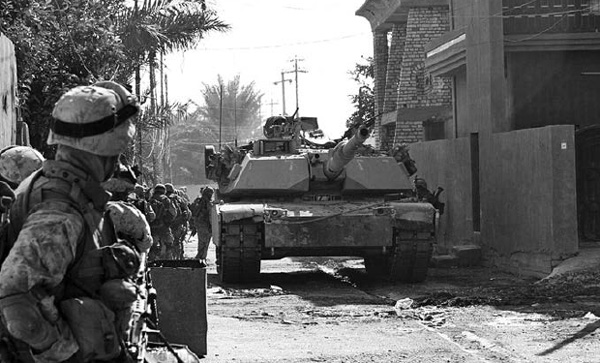
Marine main battle tanks, like this one from Company A, 2nd Tank Battalion, working hand in glove with the infantry, played a significant role in narrow city alleyways whenever possible. When a tank entered the fight, it automatically took fire away from the infantry.
U.S. Marine Corps photo by LCpl Will Lathrop
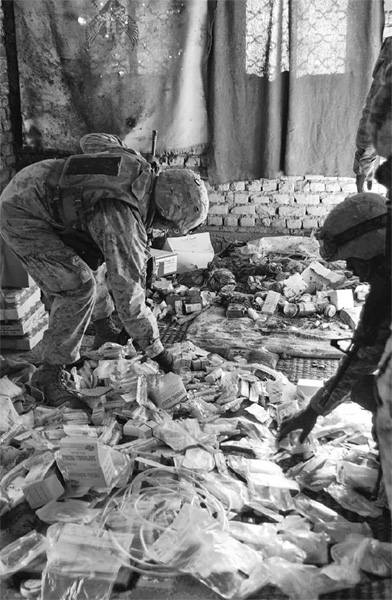
November 2004: Marines of Company L, 3rd Battalion, 1st Marines sift through a cache of packaged adrenaline and narcotics found in an abandoned Fallujah house.
U.S. Marine Corps photo by Sgt Nathan K. LaForte
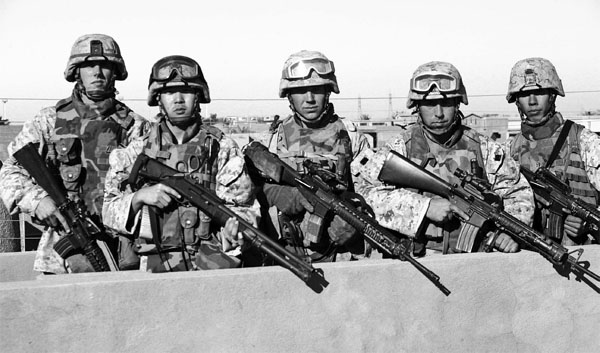
Riflemen of 3rd Platoon, Company K, 3rd Battalion, 5th Marines found that clearing buildings in Fallujah often led to firefights, adrenaline rushes, and dead terroristsâbut also cost them dearly when one of their own became a casualty.
U.S. Marine Corps photo by LCpl Miguel A. Carrasco Jr.
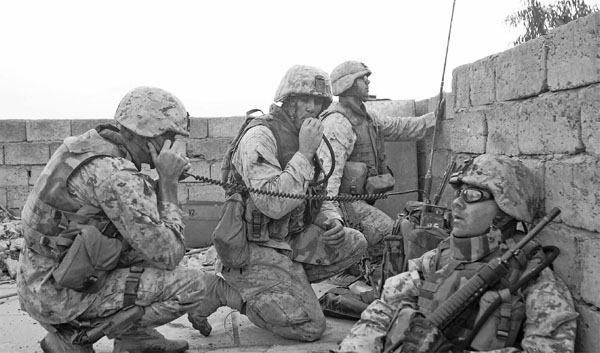
An observation post atop a Fallujah house provided opportunities to watch the terrorists move from house to house as the Marines advanced and call in supporting fires as needed.
U.S. Marine Corps photo by LCpl Trevor R. Gift
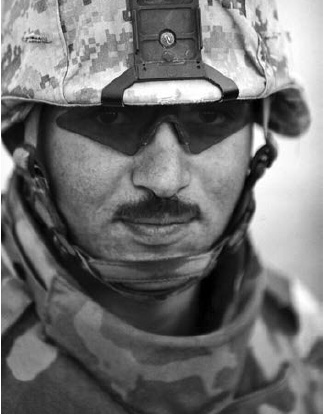
Sgt Memo M. Sandoval, a scout sniper with 3rd Battalion, 5th Marines stopped terrorists from launching a mortar attack against Marines in Fallujah. He killed three terrorists in four rounds fired from 950 yards.
U.S. Marine Corps photo by LCpl Miguel A. Carrasco Jr.
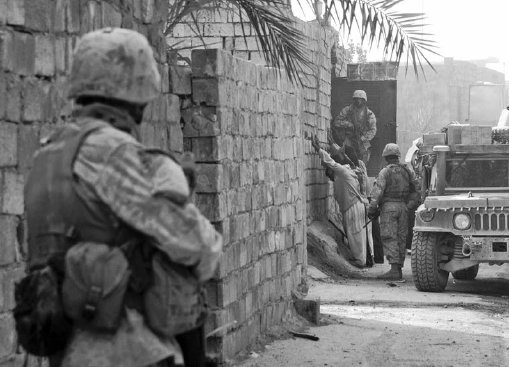
Marines of 3rd Battalion, 1st Marines move house to house in Fallujah, detaining Iraqi males of fighting age.
U.S. Marine Corps photo by Sgt Nathan K. LaForte
But his battalion commander, himself a recent recipient of orders to recruiting duty, had other plans for his staff sergeant. Being a good officer the commander realized the need for good men under his command.
“Lieutenant Colonel Donohue got orders for recruiting,” Kasal says. “Miraculously, after he got out there, my name appeared for recruiting even though I was already pending orders to go to the exchange program. I tried everything I could to get out of it. There wasn't anything I could do about it; it was a done deal and I was going.”
It was the only time in Kasal's career he was unhappy being a Marine, he says. “I was pissed off and even demotivated. I had no intentions of being a recruiter. But eventually I accepted my orders because that is what Marines do. I am not the kind of Marine that pulls that punk card that says if you make me a recruiter, I am going to get out. It's not Burger King where you can âhave it your way.' ”
Kasal set aside his disappointment and reported to the six-week Recruiting School at MCRD in San Diego in the fall of 1995. He graduated fourth among 290 students and headed north for recruiting duty at Recruiting Station (RS) Twin Cities, Minnesota.
Staff Sergeant Kasal soon discovered Marine Corps recruiters walk in the public eye every day. They are expected to act with great decorum and unceasing respect. Marine recruiters don't drink from containers while walking in public or smoke on the street while in uniform. They keep their field scarves (neckties) tightened, their blouses (shirts) buttoned, and their covers (hats) on or off as appropriate. They become marvelously adept at listening earnestly to stupid questions and endless stories about someone's uncle who was in the Corps. It is all part of the Marine mystique that makes women smile and men suck in their guts. Unfortunately it doesn't always attract recruits or convince their parents the Corps is the right choice.
“Recruiting duty is a tough and demanding job,” Kasal says. “I always believed the best way to do it was for the Marines to sell themselves. Being out in the public eye in a Marine Corps uniform is like being a walking billboard. However a lot of the young individuals didn't have a clue what to do, so it was my job to give them direction.”
After just two months in the Twin Cities Kasal was suddenly transferred to St. Cloud, Minnesota, to be Noncommissioned Officer in Charge (NCOIC) of a recruiting substation that hadn't “made mission”âproduced its quota of recruitsâin 11 months.
“The first week I was NCOIC we made mission, but I never had a day off,” Kasal says. “I worked seven days a week until ungodly hours. I detested itâbut like I said, I am a Marine.”
Leaders have problems that aren't included in the job description. One of Kasal's biggest headaches was the wife of a below-average recruiter who wanted her husband home for supper. “She would call up every day about 3 o'clock wondering if he was coming home, wondering if she should come into the office to get him,” he says. “She did nothing but bitch, bitch, bitch. It was almost as bad as combat!”
Marine Corps protocol demanded that Kasal be discreet. Privately he told the henpecked recruiter he needed to get his wife in check before it affected his career.
Kasal was on the telephone when one of his recruiters breathlessly entered the recruiting station and told him somebody had just been robbed. The recruiter, a staff sergeant named Perry, was too excited to explain the problem coherently. Kasal followed Perry to his car and jumped in.